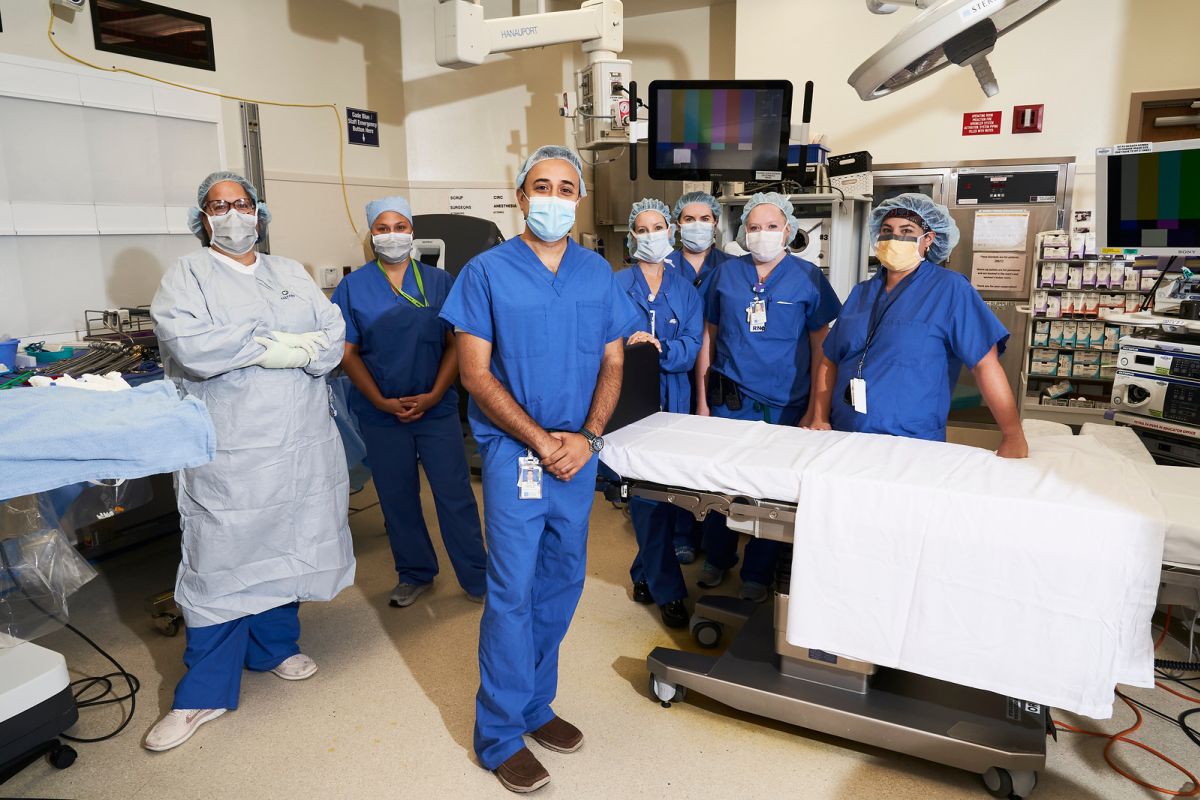- Roswell Park method dramatically reduces risk of anastomotic leak
- Study reports results from 150 consecutive surgeries performed 2020-2024
- Roswell Park performs 60-70 esophagectomies per year using this approach
NOTE: April is Esophageal Cancer Awareness Month. See “,” featuring further insights from Dr. Moshim Kukar, on the Roswell Park Cancer Talk blog.
BUFFALO, N.Y. — Roswell Park Comprehensive Cancer Center achieved textbook outcomes for 90% of 150 consecutive robot-assisted, minimally invasive esophagectomies (RAMIE) performed from 2020-2024, as in the Journal of Gastrointestinal Surgery. The term “textbook outcomes” is used in the surgical field to refer to ideal outcomes, measured by such factors as the length of hospital stay and rate of complications, readmission to the hospital and mortality within 30 days after surgery. A recently published series documenting textbook outcomes from high-volume international centers reported a range of 40-45% — roughly half the percentage achieved at Roswell Park.
“This is among the best outcome data we have seen with this operation,” says Roswell Park Chair of Surgical Oncology , first author of the study, which analyzed data from a prospective database maintained by Roswell Park. Most of the patients included in the study had stage T3 tumors, indicating that the cancer had spread to lymph nodes or nearby tissues.
Esophagectomy — removal of the diseased portion of the esophagus — is a mainstay treatment for esophageal cancer. After removal of the cancerous part of the esophagus — the tube that carries food from the throat to the stomach — the stomach is lifted up into the chest from the abdomen so it can be reattached to the remaining part of the esophagus.
The surgery is associated with serious complications and a typical mortality rate of 3-5%, even at centers that perform a high number of procedures — a characteristic usually linked to better outcomes. But the Roswell Park team achieved 30-day and 90-day mortality rates of only 0.7% and 1.3%, respectively. “That’s about one-fourth of the typical risk we would expect for these complex surgeries,” says Dr. Kukar.
Patients in the study also had a low rate of anastomotic leak, a serious complication of the surgery that occurs when the surgical area between the stomach and remaining esophagus does not heal properly.
“If the connection leaks, the patient can become extremely sick,” explains Dr. Kukar. “When gastric and esophageal fluid leak into the chest cavity, patients can require multiple additional surgeries or other procedures and have to stay in the hospital longer. Data show that complications like this affect a patient’s overall survival.
“Equally important, when a patient experiences complications, that means there will also be a delay in starting any adjuvant therapy — additional treatment required after surgery,” he adds. “If you don’t receive that therapy in a timely manner, you have an increased risk that the cancer will return.”
Previous studies have shown that even at centers that perform a high volume of these surgeries, the rate of anastomotic leak after laparoscopic or robotic surgery ranges from 15-33% — but only two of the 150 Roswell Park patients experienced a leak, and neither required an additional operation. The Roswell Park team employs the “side-to-side stapled anastomotic technique,” which is less prone to leakage than other methods.
Beginning in 2020, Roswell Park began performing all esophagectomies with RAMIE, which requires only small incisions in the abdomen and the side of the chest and is accomplished with robotic assistance. This means patients experience less blood loss and are less prone to infection, including pneumonia. The surgical robot gives the surgeon a 3D, magnified view of the operating field, and the robotic instruments can move with greater precision than the human hand — an advantage when complicated suturing is needed. Patients who undergo robotic surgery experience less pain and typically have a shorter hospital stay versus those who undergo traditional open or laparoscopic surgery; patients in the Roswell Park study had a median stay of seven days.
Roswell Park performs 60-70 esophagectomies per year using RAMIE — nearly three times the number required to be classified as a high-volume center. Dr. Kukar’s team has performed more than 700 minimally invasive esophagectomies since 2014. More than 250 of the surgeries were robot-assisted, including 150 performed during the period reported in the study, placing Roswell Park among the centers with the highest volumes for this surgery.
The Roswell Park team hopes the results of their study will encourage other centers to adopt these strategies, leading to a standardized approach to esophagectomy and better overall outcomes for more patients.
Steven Hochwald, MD, MBA, FACS, of Mount Sinai Medical Center in Miami Beach, Florida, is senior author of the study.


